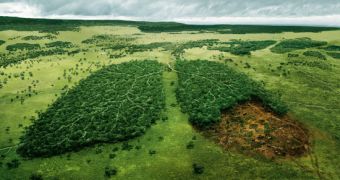Greenpeace International has released a new report showing that people living well outside the tropics are bound to sooner or later experience the effects of deforestation.
The folks at Greenpeace are no scientists, so, in order to piece together this report, they had to go through dozens of research papers published over these past few years and piece together bits and pieces of information concerning how deforestation affects agriculture, climate and weather patterns.
They found that, according to evidence at hand, chopping down one too many trees has the potential to upset temperatures, rainfall and agricultural practices not just in the areas where the unchecked deforestation takes place, but also in regions that some might think could never be affected by forest cover loss in the tropics.
“Many models show wide scientific consensus that deforestation has the potential to disrupt weather and climate systems on a local, regional and global scale,” the environmentalists write in their report, as cited by Mongabay.
In the report, Greenpeace International focuses on deforestation in Asia, Africa and the Amazon.
The organization says that, if forest cover is completely lost in the first of these regions, annual rainfall in South Asia is likely to drop by about 1mm/day. Southern China and Vietnam will be hit the hardest, meaning that yearly rainfall will be reduced by about 20-30%.
Under a complete forest cover loss scenario, local temperatures in this part of the world will increase by about 1 degree Celsius (1.8 degrees Fahrenheit), the report goes on to argue.
Complete African deforestation will translate into an increase of 1.2 – 2.4 degrees Celsius (2.16 – 2.32 degrees Fahrenheit) in local temperatures. As far as rainfall is concerned, it appears that Mozambique will start receiving significantly less rain, whereas Botswana, Zambia and the southern Democratic Republic of Congo will get wetter.
Lastly, the Greenpeace report argues that, should the Amazon lose all its forest cover, local temperatures would increase by about 2 degrees Celsius (3.6 degrees Fahrenheit) and annual rainfall would drop by 10-20%.
These changes in temperatures and rainfall will go hand in hand with disturbed agricultural practices and worsened air pollution.
In light of these findings, the organization stresses that, “Employing the precautionary principle and conserving existing forest ecosystems under a ‘Zero Deforestation’ footprint is the only way to ensure that forests continue to regulate our weather and climate, minimize the indirect effects of deforestation and conserve biodiversity.”

 14 DAY TRIAL //
14 DAY TRIAL //